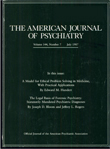Efficacy and Tolerability of Carbamazepine for Agitation and Aggression in Dementia
Abstract
OBJECTIVE: The efficacy, safety, and tolerability of carbamazepine in the treatment of agitation and aggression associated with dementia were assessed. METHOD: In a 6-week, randomized, multisite, parallel-group study of 51 nursing home patients with agitation and dementia, individualized doses of carbamazepine were compared with placebo. Except for a physician monitor and a pharmacist, all participants were blind to treatment. The primary outcome measures were the Brief Psychiatric Rating Scale (BPRS) and Clinical Global Impression (CGI) global improvement rating. Secondary measures included measures of behavior, aggression, cognition, functional status, staff time, safety, and tolerability. Intent-to-treat analysis was performed. RESULTS: The modal carbamazepine dose at 6 weeks was 300 mg/day, and a mean serum level of 5.3 μg/ml was achieved. The study was terminated after a planned interim analysis showed that carbamazepine provided more benefit than did placebo. Over 6 weeks the mean total BPRS score decreased 7.7 points for the carbamazepine group and 0.9 for the placebo group, and the weekly scores showed a gradual divergence between the two groups. CGI ratings showed global improvement in 77% of the patients taking carbamazepine and 21% of those taking placebo. Secondary analyses confirmed that the positive changes were due to decreased agitation and aggression. The drug was generally well tolerated, and no change in cognition or functional status occurred. The perception of staff time needed to manage agitation showed a decrease for carbamazepine but not placebo. CONCLUSIONS: This controlled study showed significant short-term efficacy of carbamazepine for agitation with generally good safety and tolerability. (Am J Psychiatry 1998; 155:54–61)



